

References for Inclusive Teaching and Learning
Ambrose, S., Bridges, M.W., DiPietro, M., Lovett, M.C., & Norman, M.K. (2010). How learning works: Seven research-based principles for smart teaching. San Francisco: Jossey-Bass. Chapter 6: “Why do Student Development and Course Climate Matter for Student Learning?”
Aronson, J., Fried, C.B., & Good, C. (2002). Reducing the effects of stereotype threat on African American college students by shaping theories of intelligence. Journal of Experimental Social Psychology, 38, 113–125. Available online Arvanitakis, J. & Hornsby, D.J. (Eds.) (2016). Universities, the citizen scholar and the future of higher education. Palgrave Critical University Studies. Begrer, W. (2016). A more beautiful question: The power of inquiry to spark breakthrough ideas. Bloomsbury.
Borghi, S., Mainardes, E., Silva, E. (2016). Expectations of higher education students: A comparison between the perception of student and teachers. Teritary Education and Management 22 (2) , 171-188.
Freeman, T. M., Anderman , L. H., & Jensen, J. M. (2007). Sense of belonging in college freshmen at the classroom and campus levels. The Journal of Experimental Education, 75(1), 203-220.
Gurin, P., Dey, E.L., Hurtado, S., & Gurin, G. (2002). Diversity and higher education: Theory and impact on educational outcomes. Harvard Educational Review, 72(3), 330-366.
Hockings, C. (2010) Inclusive learning and teaching in higher education: A synthesis of research. York: Higher Education Academy. Available online
Hook, J. N., Davis, D. E., Owen, J., Worthington Jr., E. L., & Utsey, S. O. (2013). Cultural humility: Measuring openness to culturally diverse clients. Journal of Counseling Psychology.
Kardia, D. & Saunders, S. (n.d.) Creating inclusive college classrooms. Available online
Nagda, B.A., Gurin, P., Sorensen, N., Zuniga, X. (2009). Evaluating intergroup dialogue: Engaging diversity for personal and social responsibility. Diversity & Democracy 12(1), 4-6.
Nash, R. J., Bradley, D.L., & Chickering, A.W. (2008). How to talk about hot topics on campus: From polarization to moral conversation. San Francisco: Jossy-Bass Publishers.
Nolinske, T. (1999). Creating an inclusive learning environment. Essays on teaching excellence. Toward the Best in the Academy 11, 3. Available online
Page, S. (2007). The difference: How the power of diversity creates better groups, firms, schools, and societies. Princeton: Princeton University Press.
Roska, J., Kilgo, C.A., Trolian, T.L., Pascarella, E.T., Blaich, C. & Wise, K.S. (2017). Engaging with diversity: How positive and negative diversity interactions influence students’ cognitive outcomes. The Journal of Higher Education 88 (3), 297-322.
Solorzano, D., Ceja M., & Yosso, T. (2000). Critical Race Theory, racial microaggressions, and campus racial climate: The experiences of African American college students. The Journal of Negro Education 69(1/2), 60-73.
Steele, C. (2011). Whistling Vivaldi: How stereotypes affect us and what we can do. Reprint ed. New York: Norton.
Stefani, L., & Blessinger, P. (Eds.). (2017). Inclusive leadership in higher Eeucation: International perspectives and approaches. Routledge.
Stone, D., Patton, B., & Heen, S. (2010). Difficult conversations: How to discuss what matters most. Penguin Books.
Tanner, K.D. (2013). Structure matters: Twenty-one teaching strategies to promote student engagement and cultivate classroom equity. CBE--Life Sciences Education 12 (3), 322–331. Available online
Tobin, T.J. (2014). Increase online student retention with Universal Design for Learning. Quarterly Review of Distance Education15.3: 13-24,48.
Tobin, T. J. (2013). Universal design in online courses: Beyond disabilities. Online Classroom 13 (12), 1-3.
Verschelden, C. (2017). Bandwidth recovery: Helping students reclaim cognitive resources lost to poverty, racism, and social marginalization. Stylus Publishing. Walton, G.M. & Cohen G.L. (2011). A brief social-belonging intervention improves academic and health outcomes of minority students. Science 331(6023), 1447-1451. Available online
Yeager, D.S. & Dweck, C.S. (2012). Mindsets that promote resilience: When students believe that personal characteristics can be developed. Educational Psychologist, 47(4), 302–314. Available online
Inclusive Education: Principles and Practice
- First Online: 29 May 2020
Cite this chapter

- Ilektra Spandagou 5
13k Accesses
It is often said that inclusive education is difficult to define and is a complex term. It is also said that inclusive education means different things to different people. While these propositions are helpful in understanding the complexity of inclusive education, they are also limiting. If inclusive education is complex and not easy to define, how can schools and teachers know how to realise it? Part of this difficulty is that inclusion, the underlying concept of inclusive education, is a broad term with applicability to different contexts. Inclusion is one of these terms that we all know what it means but it can be elusive to define.
This is a preview of subscription content, log in via an institution to check access.
Access this chapter
- Available as EPUB and PDF
- Read on any device
- Instant download
- Own it forever
- Compact, lightweight edition
- Dispatched in 3 to 5 business days
- Free shipping worldwide - see info
- Durable hardcover edition
Tax calculation will be finalised at checkout
Purchases are for personal use only
Institutional subscriptions
Armstrong, A. C., Armstrong, D., & Spandagou, I. (2010). Inclusive education: International policy & practice . London, UK: Sage. ISBN 978-1-84787-941-7.
Google Scholar
Australian Government Department of Education, Employment and Workplace Relations. (2009). Belonging, being and becoming: The Early Years Learning Framework for Australia . Canberra: Commonwealth of Australia. Retrieved from https://www.acecqa.gov.au/sites/default/files/2018-02/belonging_being_and_becoming_the_early_years_learning_framework_for_australia.pdf .
Australian Institute of Health and Welfare (2017). Disability in Australia: Changes over time in inclusion and participation in education. Cat. no. DIS 69. Canberra: AIHW. Available at: https://www.aihw.gov.au/getmedia/34f09557-0acf-4adf-837d-eada7b74d466/Education-20905.pdf.aspx .
Commonwealth of Australia. (1992). Disability discrimination act 1992 . Retrieved from http://www.austlii.edu.au/au/legis/cth/consol_act/dda1992264/ .
Commonwealth of Australia. (2005). Disability standards for education 2005 . Plus guidance notes. Retrieved from https://docs.education.gov.au/node/16354 .
Council of Australian Governments—Education Council. (2019). Alice Springs (Mparntwe) education declaration . Available at https://uploadstorage.blob.core.windows.net/public-assets/education-au/melbdec/ED19-0230%20-%20SCH%20-%20Alice%20Springs%20(Mparntwe)%20Education%20Declaration_ACC.pdf .
Dunn, L. M. (1968). Special Education for the Mildly Retarded—Is much of it Justifiable? Exceptional Children , 35 (1), 5–22. https://doi.org/10.1177/001440296803500101 .
Article Google Scholar
Florian, L. (2014). Inclusive pedagogy: An alternative approach to difference and inclusion. In F. Kiuppis & R. S. Hausstätter (Eds.) Inclusive education twenty years after Salamanca (pp. 219–229). New York: Peter Lang.
Florian, L. (2015). Conceptualising inclusive pedagogy: The inclusive pedagogical approach in action. Inclusive Pedagogy Across the Curriculum, 7, 11–24.
Florian, L., & Black-Hawkins, K. (2011). Exploring inclusive pedagogy. British Educational Research Journal, 37 (5), 813–828.
Gregson, J., Foerster, S. B., Orr, R., Jones, L., Benedict, J., Clarke, B. … Zotz, K. (2001). System, environmental, and policy changes: Using the social-ecological model as a framework for evaluating nutrition education and social marketing programs with low-income audiences. Journal of Nutrition Education and Behavior, 33 , S4–S15.
Hehir, T., Gridal, T., Freeman, B., Lamoreau, R., Borquaye, Y., & Burke, S. (2016). A summary of the evidence on inclusive education . Alana Institute. Available from https://alana.org.br/wp-content/uploads/2016/12/A_Summary_of_the_evidence_on_inclusive_education.pdf .
Poed, S., Cologon, K., & Jackson, R. (2017). Gatekeeping and restrictive practices with students with disability: Results of an Australian survey . Paper delivered at the Inclusive Education Summit (Adelaide, October 2017). Available from: http://allmeansall.org.au/wp-content/uploads/2017/10/TIES-4.0-20172.pdf .
Szumski, G., Smogorzewska, J., & Marwowski, M. (2017). Academic achievement of students without special educational needs in inclusive classrooms: A meta-analysis. Educational Research Review, 21, 35–54.
United Nations. (2006). Convention on the rights of persons with disabilities and optional protocol . New York: Author.
United Nations Committee on the Rights with Disabilities. (2016). General comment No 4—Article 24 the right to inclusive education . Available from: https://www.right-to-education.org/sites/right-to-education.org/files/resource-attachments/CRPD_General_Comment_4_Inclusive_Education_2016_En.pdf .
Additional Readings
Alves, I. (2019). International inspiration and national aspirations: Inclusive education in Portugal. International Journal of Inclusive Education 23 (7–8), 862–875.
D’Alesio, S., Grima-Farrell, C., & Cologon, K. (2018). Inclusive education in Italy and in Australia: Embracing radical epistemological stances to develop inclusive policies and practices. In M. Best, T. Corocran, & R. Slee (Eds.), Who’s in? Who’s out? What to do about inclusive education (pp. 15–32). Leiden, The Netherland: Brill.
Chapter Google Scholar
European Agency for Special Needs and Inclusive Education. (2018). Evidence of the link between inclusive education and social inclusion: A review of the literature . In S. Symeonidou (Ed.) Odense, Denmark: Author.
Download references
Author information
Authors and affiliations.
Sydney School of Education and Social Work, The University of Sydney, Camperdown, NSW, Australia
Ilektra Spandagou
You can also search for this author in PubMed Google Scholar
Corresponding author
Correspondence to Ilektra Spandagou .
Rights and permissions
Reprints and permissions
Copyright information
© 2020 Springer Nature Singapore Pte Ltd.
About this chapter
Spandagou, I. (2020). Inclusive Education: Principles and Practice . In: Inclusive Education in Schools and Early Childhood Settings. Springer, Singapore. https://doi.org/10.1007/978-981-15-2541-4_4
Download citation
DOI : https://doi.org/10.1007/978-981-15-2541-4_4
Published : 29 May 2020
Publisher Name : Springer, Singapore
Print ISBN : 978-981-15-2540-7
Online ISBN : 978-981-15-2541-4
eBook Packages : Education Education (R0)
Share this chapter
Anyone you share the following link with will be able to read this content:
Sorry, a shareable link is not currently available for this article.
Provided by the Springer Nature SharedIt content-sharing initiative
- Publish with us
Policies and ethics
- Find a journal
- Track your research

Site Content
International perspectives on inclusive education.
In the Light of Educational Justice
Edited by Simone Seitz, Petra Auer, and Rosa Bellacicco
Verlag Barbara Budrich
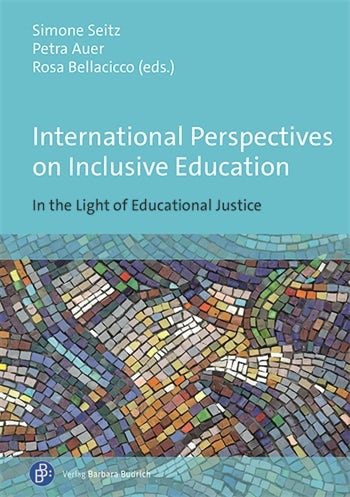
Pub Date: April 2023
ISBN: 9783847426981
Format: Paperback
List Price: $85.00
Shipping Options
Purchasing options are not available in this country.
About the Author
- Social Sciences

Yenda Prado is an emerging technologies researcher, educator, and author. She has written and advised on inclusive technology use in education and media for diverse organizations including the U.S. Department of Education, PBS Kids, and the University of California.
Mark Warschauer is Professor of Education and Informatics at the University of California, Irvine, where he directs the Digital Learning Lab. He carries out research and development on digital tools and environments to support diverse learners. He is a member of the National Academy of Education.
- ‹ Prev
- Next ›
Appendix A: Methods for Investigating Inclusive Education
- Published: 2024
- Open the Chapter PDF for in another window
- Permissions
- Cite Icon Cite
2024. "Appendix A: Methods for Investigating Inclusive Education", Voices on the Margins : Inclusive Education at the Intersection of Language, Literacy, and Technology , Yenda Prado, Mark Warschauer
Download citation file:
- Ris (Zotero)
- Reference Manager

A product of The MIT Press
Mit press direct.
- About MIT Press Direct
Information
- Accessibility
- For Authors
- For Customers
- For Librarians
- Direct to Open
- Open Access
- Media Inquiries
- Rights and Permissions
- For Advertisers
- About the MIT Press
- The MIT Press Reader
- MIT Press Blog
- Seasonal Catalogs
- MIT Press Home
- Give to the MIT Press
- Direct Service Desk
- Terms of Use
- Privacy Statement
- Crossref Member
- COUNTER Member
- The MIT Press colophon is registered in the U.S. Patent and Trademark Office
This Feature Is Available To Subscribers Only
Sign In or Create an Account

Book series
Book titles in this series
Inclusive pedagogical practices amidst a global pandemic.
Issues and Perspectives Around the Globe
- Lawrence Meda
- Jonathan Chitiyo
- Copyright: 2022
Available Renditions
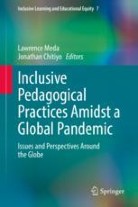
Pedagogical Responsiveness in Complex Contexts
Issues of Transformation, Inclusion and Equity
- Elizabeth Walton
- Ruksana Osman
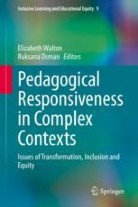
Global Inclusive Education
Lessons from Spain
- Jordi Collet
- Mila Naranjo
- Jesús Soldevila-Pérez
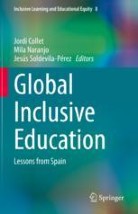

Ethics and Inclusive Education
Disability, Schooling and Justice
- Gordon Tait
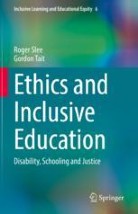
Improving Inclusive Education through Universal Design for Learning
- Alvyra Galkiene
- Ona Monkeviciene
- Open Access
- Copyright: 2021
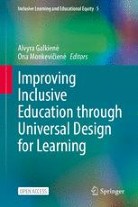
Inclusion, Disability and Culture
An Ethnographic Perspective Traversing Abilities and Challenges
- Santoshi Halder
- Lori Czop Assaf
- Copyright: 2017
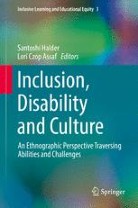
Education for Children with Disabilities in Addis Ababa, Ethiopia
Developing a Sense of Belonging
- Margarita Schiemer
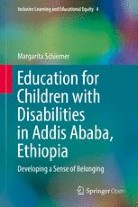
Teacher Education for the Changing Demographics of Schooling
Issues for Research and Practice
- Lani Florian
- Nataša Pantić
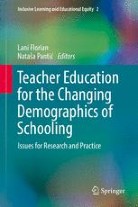
Wellbeing, Equity and Education
A Critical Analysis of Policy Discourses of Wellbeing in Schools
- Jennifer Spratt
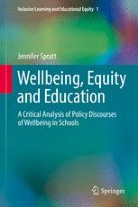
Publish with us
- Find My Rep
You are here
Inclusive Education International Policy & Practice
- Ann Cheryl Armstrong - University of the South Pacific, Fiji
- Derrick Armstrong - University of Sydney, Australia
- Ilektra Spandagou - University of Sydney, Australia
- Description
Bringing together issues of theory, research, policy and practice from both the countries of the South and the North, this ground-breaking book provides a critical discussion of recent developments in the field of inclusive education.
The authors consider developments, both in current thinking about the meaning of inclusion and in terms of policies and practices, in the context of education systems across the world and their differences and inter-relatedness. Topics covered include the increasing pressure on educators to develop a global policy agenda for inclusive education, the individual needs of children, the illusion of inclusivity and the importance of local contexts in determining policy. The book's international perspective illuminates common successes, failures and concerns.
With case studies from Europe, the Caribbean and Australasia, the book also features chapter summaries, questions to facilitate critical thinking and discussion, case studies and suggestions for further reading.
An essential read for anyone studying inclusive education, special educational needs, disability studies, social policy and international and comparative education, this book will ignite debate and enable the reader to develop a deep understanding of the issues.
'This is a book that would be of interest and of value to those completing additional study in education as it contains theory, research, policy and practice and is complimented by chapter summaries, case studies and points for reflection and discussion' -
Learning and Teaching Update
'This is not a feel-good book, even though it hopes and believes in a better education and better lives for all. It is an exquisite balance between the theory, policy and practice of inclusive education. It confronts the difficulties with the term, and the bifurcation in policy and practice of ability/disability, advantage/disadvantage, normality/diversity. It provides a major commentary on education and its restricted and restrictive models, which exclude not just certain bodies but also what they embody' - Trevor Gale, Director, National Centre for Student Equity in Higher Education, University of South Australia
'This book is essential reading for all concerned with the issue of inclusive education, addressing key themes, ideas and existing understandings in a critical, innovatory and informative manner. Through cross-cultural insights and practices, questions of definition, the impact of globalisation and the unacceptable dominance of North over South interests and concerns are carefully highlighted and challenged. The authors have provided a lucid, readable, clear and critical contribution to our knowledge and understanding of this fundamentally important issue' - Emeritus Professor Len Barton, Institute of Education, University of London
'This book offers a powerfully argued and long overdue critique of international developments in inclusive education....SENCOs, or other education professionals who may wish to study or work in international contexts, and developing countries in particular, will learn much from this book' - SENCO Update
A great book, added to the reading list
fabulous book great addition, great resource to keep going back to.
A good book to use for student reading on inclusive education at under graduate level and introductions to Masters if new to the student.
There are critical areas within this book that promote debate. It is a very good read for undergraduates on any education or SEND course. The additional reading at the end of the chapters signpost to further support one's understanding. Overall a well laid out book which is informative.
This book will form part of the revised reading list for this course thanks you
A very clearly set out book: overview of the chapter at the start, discussion questions and points for reflection and a chapter summary orientate the reader well. Key policies and legislation are identified and it is good to have the international perspective, especially for my MA Dyslexia researcha nd practice students. A comprehensive book around inclusion
Offer an international / global/ comparative dimension to the literature in the field, which many other texts do not Good use of Chapter introductions, chapter summaries and discussion activities
Points for discussion and reflection boxes allow students to explore and critically evaluate their own practice. Ideal for students exploring the international perspective.
This book covers the key policies and legislation underpinning inclusive education. With thought-provoking discussion points in each chapter this would be of particular interest to those on initial teacher education courses.
Preview this book
Sample materials & chapters.
Chapter One
Chapter 3: 'The Current State of Inclusive Education'
For instructors
Please select a format:
Select a Purchasing Option
- Electronic Order Options VitalSource Amazon Kindle Google Play eBooks.com Kobo
Related Products

SAGE Knowledge is the premier social sciences platform for SAGE and CQ Press book, reference and video content.
The platform allows researchers to cross-search and seamlessly access a wide breadth of must-have SAGE book and reference content from one source.

On The Site
Inclusive education.
Preparing your PDF for download...
There was a problem with your download, please contact the server administrator.
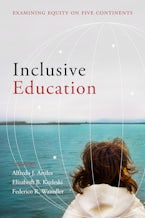
DOWNLOAD BOOK DETAILS
Examining Equity on Five Continents
Edited by Alfredo J. Artiles , Elizabeth B. Kozleski and Federico R. Waitoller
320 Pages , 6.00 x 9.00 in
- 9781612501154
- Published: November 2011
Other Retailers:
- Barnes & Noble
- Description
Alfredo J. Artiles is professor of Culture, Society, and Education in the School of Social Transformation at Arizona State University. His interdisciplinary scholarship examines the ways cultural practices and ideologies of difference mediate school responses to students’ needs. His research also focuses on teacher learning for social justice. Artiles has published extensively for research, policy, and practice audiences in education, psychology, and related disciplines. His work has been published or reprinted in English, Spanish, French, Portuguese, and Hungarian. He is editor of the International Multilingual Research Journal , and edits the book series Disability, Culture, and Equity (Teachers College Press). Artiles has made over 240 professional presentations in the United States, Latin America, Africa, and Europe. He is vice president of the American Educational Research Association’s (AERA) Division on the Social Contexts of Education (2009–2011), an AERA Fellow, a Spencer Foundation/National Academy of Education Postdoctoral Fellow, and a Resident Fellow at the Center for Advanced Study in the Behavioral Sciences (Stanford University). His work has been supported by the U.S. Department of Education, the Spencer Foundation, the University of California’s Linguistic Minority Research Institute, Vanderbilt University’s Learning Sciences Institute, and the Motorola Foundation, among others. Elizabeth B. Kozleski holds an EdD from the University of Northern Colorado. She is a professor of Culture, Society, and Education in ASU’s School of Social Transformation. She holds the UNESCO Chair in Inclusive International Research and the national 2011 TED-Pearson award for Teacher Education. Her scholarship theorizes and examines systems transformation in schools; how identity, culture, ability, and practices are negotiated in classrooms and schools; and how schools become purposeful sites for professional learning. Her work has been recognized internationally and includes a coedited (with Alfredo Artiles) book series, Disability, Culture, and Equity (Teachers College Press). Federico R. Waitoller is an assistant professor at the Special Education Department in the College of Education at the University of Illinois at Chicago. He has been awarded the American Educational Research Association Minority Dissertation Fellowship and has presented his work at national and international conferences and research forums. His research agenda focuses on contemporary equity challenges in inclusive and urban education. In particular, he studies the role of institutions and educational reforms in mediating teachers’ identity and learning for inclusive education and the overrepresentation of minority students in special education. Waitoller has published his work in national and international peer-reviewed journals and in edited volumes. His most recent publications (with colleagues) include “The Miners Canary: A Review of Overrepresentation Research and Explanations” ( Journal of Special Education ) and “Teacher Learning for Inclusive Education: Understanding Teaching as a Cultural and Political Act,” ( International Journal of Inclusive Education ).
“The discourse of inclusion in the United States has clung to thin examinations of professional practices and standardized notions of student deficits. This volume offers a thoughtful remedy by exploring the cultural and political dimensions that contribute to the construction of human difference in a variety of local contexts. Appreciated in contextual complexity, inclusion is much more than a question of disability and accommodation. It presses us to question our highest purposes and hopes for schooling.” — Scot Danforth , professor and director, School of Teacher Education, San Diego State University
“At a time when most countries are struggling to develop more equitable education systems, this book provides a rich and valuable resource of ideas. Drawing on accounts of developments in diverse countries, the volume is unusual in the way that it conceptualizes inclusive education as being about a broad range of groups that are vulnerable to marginalization, exclusion, and low achievement.” — Mel Ainscow , professor, University of Manchester, United Kingdom
“This powerful collection of cross-cultural analyses penetrates the dilemma of implementing inclusion and equity within the contexts of vastly differing cultures and histories. Unique in its range of empirical and theoretical perspectives, Inclusive Education persuades us that, while it is impossible to devise a one-size-fits-all model of inclusion, the hallmark of education in the twenty-first century must be a global commitment to the search for equity.” — Beth Harry , professor and chair, Department of Teaching and Learning, University of Miami
Related Books

- Technical Support
- Find My Rep
You are here
The Paraprofessional's Essential Guide to Inclusive Education
- Peggy A. Hammeken
- Description
"A well-designed reference and learning tool for paraprofessionals. The valuable templates can easily be reproduced and used with students." —Renee Bernhardt, Special Education Teacher Johnston Elementary School, Woodstock, GA
"This is a great guide. I have already used excerpts for an informal paraprofessional workshop in my school. The paraeducators thought that it covered all the areas of concern that they have. They couldn't believe how many ready-to-use ideas it had." —Dawne Dragonetti, Special Education Teacher and Instructional Coach Center School, Stow, MA
Hundreds of strategies that promote success for struggling students in inclusive classrooms!
Paraprofessionals are essential in helping students with special needs access the general education curriculum and receive the individualized attention they need. This updated edition of Inclusion: An Essential Guide for the Paraprofessional answers paraprofessionals' most common questions and provides extensive strategies for all content areas.
Developed as a daily, hands-on working manual, the completely revised edition includes a new chapter on reading, expanded chapters throughout, additional activities for classroom use, more than 75 new strategies, and more than 50 forms available on a CD-ROM for easy reproduction. Ideal for experienced or novice paraprofessionals, this volume includes techniques for supporting students in reading, spelling, language, and mathematics, and covers topics such as:
- Inclusive practices
- Policies, procedures, and schedules
- Accommodations and modifications for the classroom
- Communication and organizational skills
- Peer tutoring
- Behavior management
- Confidentiality and reporting
Also an appropriate handbook for working with general education students who may need additional help to experience academic success, this resource provides the ideal support for all paraprofessionals working in the general education classroom.
See what’s new to this edition by selecting the Features tab on this page. Should you need additional information or have questions regarding the HEOA information provided for this title, including what is new to this edition, please email [email protected] . Please include your name, contact information, and the name of the title for which you would like more information. For information on the HEOA, please go to http://ed.gov/policy/highered/leg/hea08/index.html .
For assistance with your order: Please email us at [email protected] or connect with your SAGE representative.
SAGE 2455 Teller Road Thousand Oaks, CA 91320 www.sagepub.com
"A well-designed reference and learning tool for paraprofessionals. Many of the suggestions, examples, and vignettes could be applied to general educations students as well as those with disabilities. The valuable templates can easily be reproduced and used with students."
“This is a great guide. I have already used excerpts for an informal paraprofessional workshop in my school. The paraeducators thought that it covered all the areas of concern that they have. They couldn’t believe how many ready-to-use ideas it had and felt that the appendix alone was worth the price.”
"Hammeken has provided an invaluable tool for paraprofessionals, school administrators, and teachers, both general and special. This book is a goldmine of information."
"I highly recommend this for paraeducators, special and general education teachers, and problem-solving teams looking for things to try for students. Get many copies!"
- Over 400 strategies for working with students with special needs in an inclusive classroom or resource room setting
- A brand-new chapter on reading with specific strategies and material to enhance student support in the areas of decoding, comprehension, and vocabulary development, along with new supplemental forms.
- Updated discussion of special education legislation
Appendix and CD includes over 50 reproducible forms to help with communication, planning, documentation, supplemental student aids, and more!
Preview this book
Sample materials & chapters.
Chapter 1: Building Background
Search Utah State University:
Inclusive Excellence offers discussion-based book clubs for faculty, students, and staff.
These book clubs bring people together to learn about critical issues in education, politics, and society. Each book club stresses the core values of mutual respect, civil discourse, advocacy, accountability, responsibility, and community.
Faculty and Staff Book Clubs
Inclusive excellence book club, disagree better book club, student book club.
In cooperation with the University Honors Program, Inclusive Excellence hosts one book club for USU students:
Free Speech Book Club
If you have any questions about these book clubs, please contact Dr. Chris Babits at [email protected] .

IMAGES
VIDEO
COMMENTS
The 20 best inclusive education books, such as The Essentials, The Inclusion Toolbox and Inclusive Classroom, The. Categories Experts Newsletter. BookAuthority; BookAuthority is the world's leading site for book recommendations, helping you discover the most recommended books on any subject. Explore; Home; Best Books; New Books ...
Expectations of higher education students: A comparison between the perception of student and teachers. Teritary Education and Management 22 (2), 171-188. Freeman, T. M., Anderman , L. H., & Jensen, J. M. (2007). Sense of belonging in college freshmen at the classroom and campus levels. The Journal of Experimental Education, 75(1), 203-220.
Inclusive Education for the 21st Century provides a rigorous overview of the foundational principles of inclusive education and the barriers to access and participation. It explores evidence-based strategies to support diverse learners, including specific changes in curriculum, pedagogy and assessment practices, and the use of data.
The book offers a checklist of 15 key inclusive education best practices that together comprise quality inclusive education. Each chapter details an individual best practice and provides a list of best practice indicators that deconstruct the best practice. Readers are instructed to rate the degree to which the each indicator occurs in their ...
Thoroughly revised throughout, this bestselling book returns in a new edition to take an even more comprehensive look at the question: How can teachers and schools create genuinely inclusive classrooms that meet the needs of every student? Inclusive Education for the 21st Century provides a rigorous overview of the foundational principles of inclusive education and the barriers to access and ...
This handbook provides foundational, conceptual, and practical knowledge and understanding of inclusive education and special needs education. It highlights the need for preparing special educators and teachers for inclusive classrooms to effectively cater to the needs of students with diverse needs in various low-, middle-, and high-income ...
According to General Comment 4, inclusive education has the following features: (a) whole systems approach, (b) whole educational environment, (c) whole person approach, (d) supported teachers, (e) respect for and value of diversity, (f) learning-friendly environment, (g) recognition of partnerships, and (h) monitoring.
With chapters from leading experts from Australia and the UK, Inclusive Education for the 21st Century addresses common issues in both primary and secondary schools. Underpinned throughout by research evidence, it is designed to assist educators to develop the deep knowledge required to make inclusive education a reality in all schools.
This book takes this up and focuses on the often blurred relationship between inclusive education and educational equity. By compiling current research results and theoretical contributions from several European countries on the topic, the authors create an overarching framework for discussion.
Books. Inclusive Education: Perspectives on pedagogy, policy and practice. Zeta Brown. Routledge, Apr 28, 2016 - Education - 200 pages. Inclusive education is complex, multi-faceted and ever-changing and to date there has been no fixed definition of what is meant by the term 'inclusion', leading to confusion about what inclusive education ...
Inclusive education is not just a goal; it is a commitment to making sure that every student, regardless of their unique needs, can learn, grow, and thrive in a diverse classroom. However, as we explore the world of inclusive practices, it becomes evident that there are challenges to overcome, but also innovative solutions to celebrate.
Introduction. The general focus on school inclusion can be traced back to The Salamanca Statement and Framework for Action on Special Needs Education that was crafted in 1994 (UNESCO Citation 1994).The Salamanca document features normative principles for inclusion that recognise institutions that include every student, highlight diversity as an asset, support learning, and respond to ...
About this book series. This series addresses the many different forms of exclusion that occur in schooling across a range of international contexts and considers strategies for increasing the inclusion and success of all students. In many school jurisdictions the most reliable predictors of educational failure include poverty, Aboriginality ...
Inclusive education is the term now being used to incorporate special needs into mainstream education. This selection of papers - divided into three sections - provides different perspectives & dialogue on inclusive education from around the world. The book defines the philosophical, political, educational & social implications of 'inclusion', & maps out the dilemmas facing it.
This book series reflects on the challenges of inclusive education as a strategy for improving educational equity. The series addresses issues of diversity in support of the UN Sustainable Development Goals (SDGs) which set the global education agenda for 2030 in SDG 4: Ensure inclusive and quality education for all and promote lifelong learning.
Yenda Prado is an emerging technologies researcher, educator, and author. She has written and advised on inclusive technology use in education and media for diverse organizations including the U.S. Department of Education, PBS Kids, and the University of California.
Aims and Scope:This book series reflects on the challenges of inclusive education as a strategy for improving educational equity. The series addresses issues ...
An essential read for anyone studying inclusive education, special educational needs, disability studies, social policy and international and comparative education, this book will ignite debate and enable the reader to develop a deep understanding of the issues. Ann Cheryl Armstrong is the Director of the Division of Professional Learning ...
One of the ongoing challenges faced by school teachers at all levels is including students with special needs in regular classrooms. This is a practical guide to working with primary and secondary students who need extra attention because of disabilities or giftedness.The authors of this accessible and invaluable book outline the principles behind educational diversity and inclusive policies ...
DOWNLOAD BOOK DETAILS. Inclusive Education Examining Equity on Five Continents. Edited by Alfredo J. Artiles, Elizabeth B. Kozleski and Federico R. Waitoller. 320 Pages, 6.00 x 9.00 in. Paperback; 9781612501154; Published: November 2011; $34.00. Buy
Ideal for experienced or novice paraprofessionals, this volume includes techniques for supporting students in reading, spelling, language, and mathematics, and covers topics such as: Inclusive practices. Policies, procedures, and schedules. Accommodations and modifications for the classroom. Communication and organizational skills. Peer tutoring.
The book engages with thinking about Inclusive Education, challenging readers to evaluate the current Inclusive Education philosophies and polices from an African perspective and identifying limitations within current approaches. It engages with African worldviews, epistemologies and values as a means of creating space for effective and culturally sensitive ways of implementing the vision of ...
Inclusive Excellence offers discussion-based book clubs for faculty, students, and staff. These book clubs bring people together to learn about critical issues in education, politics, and society. Each book club stresses the core values of mutual respect, civil discourse, advocacy, accountability, responsibility, and community.